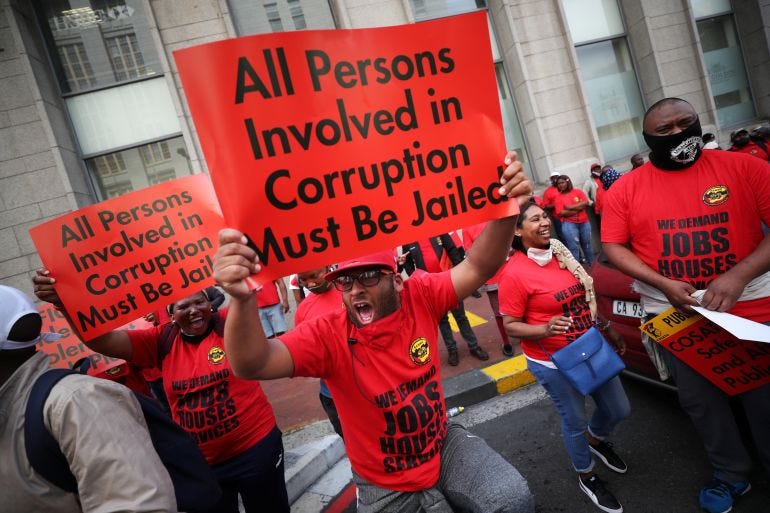5 Must-Read Articles for New Subscribers
Here are a few articles I’ve written that I believe are worth checking out
Many of you are enjoying my pieces beyond African country reviews.
I've noticed a gap between my old and new readers. For example, some are unfamiliar with topics like domestic savings rates or “the patronage political economy”, while others have heard me mention them countless times.
Here are a few of my best pieces for new readers:
#1
Thoughts about Corruption in Developing Countries
In grad school, during an international macro class discussion on corruption, each of us felt like we were competing to claim that our country or our parent’s country was the #1 most corrupt nation on earth.
In “Thoughts on Developing Countries” I challenge the common belief that "X can’t develop because of corruption."
History shows that literally any country like 18th-century UK, 19th-century America, 20th-century Italy, 20th-century Japan, post WW2 Taiwan, post WW2 South Korea, and more developed while deeply corrupt. This includes China as well.
The key isn't corruption itself but the type—some forms drive growth, while others hinder it. I’m not saying corruption is good or shouldn’t be addressed, but thinking development can’t happen because of it, is backwards. You can't eliminate endemic corruption before you develop.
Corruption's impact—whether it helps or hinders—depends on a country's unique political economy. Simplifying "corruption" as the root problem is a superficial response that sidesteps the more complex question: How can certain “corrupt” power structures and networks be more aligned to become more productive, and what makes them currently destructive?
This question is challenging to answer because it varies across nations and lacks transparency. However, for those aspiring to understand or shape policy, understanding an economy through this nuanced lens is far more valuable than blanket statements like “Nationalize everything”, “Capitalism will fix everything,” or “Just end corruption”. If any of those blanket ideologies were true, then post-independence African Socialism, the World Bank’s 1980s neoliberalism era, or the World Bank’s 1990s “good governance” era, would have had more success. While it may be uncomfortable, grasping the underlying factors that contribute to a country's low state capacity is infinitely more useful than relying on oversimplified, psychologically satisfying solutions.
#2
Are there Former Colonies or Vassal States with Similar or Better Living Standards than their Previous Overlord?
So I follow Matthew Yglesias on Twitter and saw his tweet:
In this article on “Are there Former Colonies or Vassal States with Similar or Better Living Standards than their Previous Overlord?”, I explore examples of colonies that have surpassed their imperial rulers. While rare, they do exist. Here’s some examples:
The Dominican Republic surpassed Haiti (Haitian Empire)
Macau overtook Portugal (Portuguese Empire)
Bulgaria, Romania, Greece, and others surpassed Turkey (Ottoman Empire)
Bangladesh surpassed Pakistan
Numerous former British colonies & protectorates now have better living standards than the UK.
Additionally, South Korea and Taiwan, once colonies of Imperial Japan, have either matched or surpassed Japan, depending on whether you measure by market exchange rates or purchasing power parity.
#3
Special Economic Zones: A Primer
A Special Economic Zone (SEZ) is designed to transform the business environment in a specific area. The government typically offers tax breaks, tariff reductions, and other incentives to encourage investment. Each SEZ operates differently—some focus on tax exemptions, while others offer relaxed labor…
Some believe special economic zones (SEZs) are the key to development because they worked in China. In Special Economic Zones: A Primer, I challenge the notion that simply offering tax breaks in a zone with relatively better electricity & infrastructure than the rest of the country will spur growth. The success of SEZs is a coin flip—while Shenzhen, China thrived, Fordlandia, Brazil failed.
Sometimes, investors aren't interested, or governments fail to provide the right incentives or coordination. But that doesn't mean SEZs aren't worth trying. China has 10 times more SEZs than all of Africa combined, and India has 50% more than the continent as well.
#4
Who Owns that Developing Country's Debt?
Reading/Speaking time: 13 min read or 19 minute listen at 1x speed.
Nonsense about which countries owe debt to whom is widespread. For example I still see people saying Haiti still owes debt to France. That debt was paid off in 1947 (still took over a century), Haiti has gotten debt relief twice, and now Haiti is largely indebted to Venezuela due to buying their oil on credit.
In “Who Owns that Developing Country’s Debt?” I break down the debt owed by various nations and why they borrow. Thinking developing countries shouldn't borrow ignores reality—the real challenge is how they can grow to repay their foreign currency denominated debts.
Also contrary to popular belief, the Chinese government is Africa's largest bilateral lender, not Africa’s biggest lender overall.
China is Africa's largest bilateral lender, meaning that the Chinese government lends the most to an African country on a government to government basis. China has lent more than the America government, Turkey, UAE or etc. France is in second place.
Private debt is the most expensive, with market-based interest rates, while multilateral and bilateral loans are concessional, offering below-market rates or more generous pay back periods. A significant portion of African debt comes from Eurobonds—bonds issued in U.S. dollars, despite the name—where African governments pitch to international private investors to lend to them.
#5
Steering Globalization: The Humans' Hand Behind the Trend
What is Globalization? How is it Measured?
Globalization has always been present, seen in imperialism, the gold, spice, and slave trades, and colonization.
However, in “Steering Globalization: The Human’s Hand Behind the Trend”, Obama defines it as the "integration of national economies into a global economy." By this measure, globalization is reflected in trade as a percentage of global economic output.
This percentage isn't guaranteed to rise, even with advancing technology. In fact, policies can cause it to decline:
In 1913, the world was more globally integrated than in 1965, which is surprising given the limited technology of that time—telegraphs and zeppelins—compared to the modern advances of 1965: cars, telephones, radios, airplanes, trains, cargo ships, TVs, and early satellite communication.
This piece explores how globalization is largely concentrated in North America, East Asia, and Europe, as these regions account for 80% of global trade, mostly in intermediate goods. Commodity exporters, meanwhile, sit at the tail end of the supply chain.
I also discuss how both Trump and Biden have worked to reform or dismantle the WTO, as it no longer serves "American interests." This phrase, often vague, reflects America’s frustration over China not “behaving” like Japan did after China joined the WTO in 2001. Biden’s trade representative, Katherine Tai, even remarked that the WTO is on "thin ice." I'll follow up on her vision for its future.













Great idea to write an article to get new subscribers to read your best articles. I think one of the worst things about Substack (and social media in general) is how difficult it is to get people to read older articles even if they are still relevant. I think it is mainly driven my recency bias, but newer does not mean better.